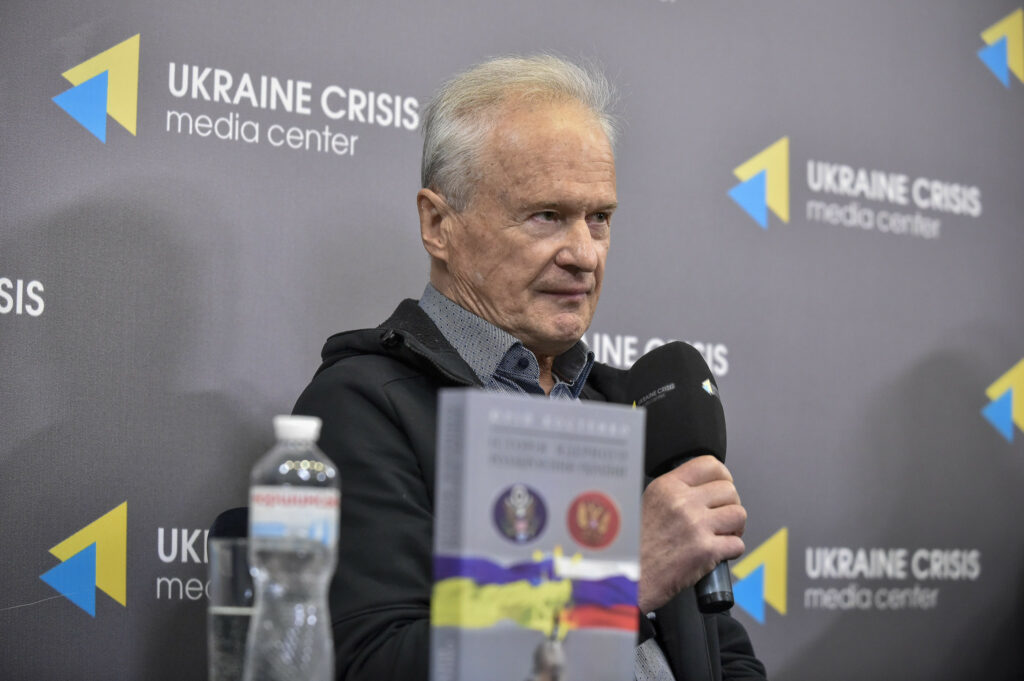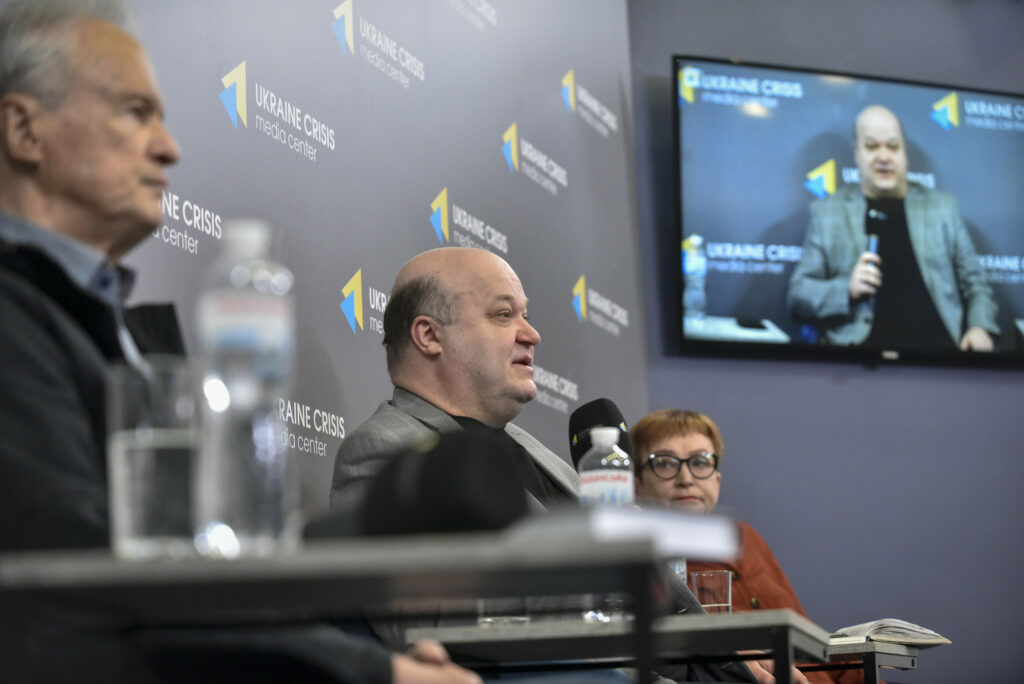Another meeting in the Geopolitical dialogues format was devoted to the topic, which, according to Valeriy Chaly, Chairman of the UCMC Board, Ambassador Extraordinary and Plenipotentiary of Ukraine, acquires a whole new meaning in recent months. Very dangerous signals sent by russia regarding its plans to use nuclear technologies and possibly weapons in outer space, as well as russia’s veto on the UN Security Council’s resolution aimed at preventing such developments indicate that the world is entering a new stage of the nuclear arms race.
“The process has taken the path that was hard to imagine even a few years ago. This issue is increasingly being seen in terms of a possible scenario under which military conflicts may be accompanied by the use of mass destruction weapons rather than in terms of deterring military conflicts… There are confirmed cases of the use of chemical weapons by the russian army on the territory of Ukraine, many statements by russia’s official representatives on nuclear blackmail, as well as their continued use of important infrastructure facilities, in particular the Zaporizhzhia nuclear plant, as a weapon in a conventional war,” he said. representative of Ukraine to the IAEA Board of Governors
Yuriy Kostenko, former Minister of Environmental Protection and Nuclear Safety of Ukraine, ex-representative of Ukraine to the IAEA Board of Governors, agreed with this assessment.
“You are absolutely right in the sense that russia’s aggression against Ukraine actually started a new stage of the nuclear arms race. I would like to return to the history of the nuclear arms race. Ukraine played a unique role not only in the sense that, unfortunately, it transferred the world’s third most powerful nuclear potential into the hands of a potential aggressor. This stopped not only the nuclear arms race, but also the very process of development of new nuclear weapons by other countries. In the early 1990s, more than 15 countries were working on their own nuclear military programs. In 1995, the term of the treaty on the non-proliferation of nuclear weapons, which was signed in 1968, was ending, and the issue of its continuation was practically unrealistic. And it was the nuclear disarmament of Ukraine that made it possible not only to extend the treaty, but to extend it as a permanent treaty,” Yuriy Kostenko noted.
Thus, Ukraine played a unique role in the international nuclear policy, which, according to the expert, was underestimated not only by the nuclear countries, but also by the whole world, and this underestimation was manifested in the fact that the Budapest memorandum guaranteeing our security did not work.
“All this inaction, and first of all on the part of the IAEA, in my opinion, led to the fact that various countries of the world began to take the stance that nuclear disarmament did not give what was promised by the nuclear countries – movement towards a nuclear-free world . And so the example with Ukraine prompted many politicians to think about their own nuclear weapons development programs. The nuclear Pandora’s box has been opened,” the speaker concluded.
What should the Ukrainian state do in such conditions? Nuclear power expert Olha Kosharna, focused on the inactivity of the relevant authorities. At one time, she specified the violations of Ukrainian legislation in terms of nuclear security committed by the russians. This alone should have been enough for the State Atomic Energy Regulatory Commission to react.
“Secondly, in my opinion, we do not use international platforms, as russia does. We now have a unique opportunity to participate and shape the agenda in the IAEA Board of Governors, but we are not doing it. A meeting of the IAEA Board of Governors is planned in June, during which the list for rotation of its members will be agreed upon. This is precisely the reason to take the initiative to suspend russia’s membership as a violator of international law in the sphere of ensuring traditional nuclear security and the international convention against acts of nuclear terrorism. Especially since there was already such a precedent. In the 1970s, South Africa lost its membership in the IAEA Board of Governors due to apartheid,” suggested Olha Kosharna.
She added that until now, documents about russia’s violation of Article 2 of the international convention against nuclear terrorism have not been officially sent. The relevant package was prepared by the Ministry of Justice, but the Ministry of Foreign Affairs did not agree on it.
“I also believe that there are shortcomings in their work. You are right. I share this opinion in terms of diplomatic experience. This is an international structure where we need to communicate,” said Valeriy Chaly, addressing the expert.
He noted that there are people who have work experience in both the Ministry of Energy and Energoatom, who have diplomatic experience in high positions in Ukraine. Therefore, it would be correct to seriously revise the composition of the delegation at the next June meeting if the goal of stopping Russia’s participation in the IAEA is not achieved. ”
“We cannot partially address this issue. There should be work in a 24×7 mode,” the diplomat urged.
The discussion participants did not ignore the topic of the prospects of returning nuclear status to Ukraine. This view is finding increasing support, and it is important to hear what professional experts think about this.
Yuriy Kostenko emphasized that it is harmful to ask such questions to the political authorities in Ukraine now.
“First of all, we are a party to the Treaty on the Non-Proliferation of Nuclear Weapons as a nuclear-free country, and any step towards acquiring nuclear status is immediately exposed to the possibility of introducing international sanctions against Ukraine, including from democratic countries. And secondly, how will Ukraine get funds for its own very expensive nuclear military program? Yes, we have a colossal amount of spent nuclear fuel, in particular, the Chornobyl nuclear power plant alone has enough plutonium and highly enriched uranium to turn it into nuclear warheads, but how do we create a military-industrial complex and finance this program?”
In this regard, the former Minister of Environmental Protection and Nuclear Safety of Ukraine appealed to the relevant departments and the President’s office with clarifications about the impossibility for Ukraine today even to look in the direction of this military nuclear program.
“These are Kremlin’s purely provocative preparations, with which they are trying in one way or another to put up another barrier between Ukraine and the collective West, which together with Ukraine is fighting against russian aggression. Today, Ukraine, first of all, must be given conventional weapons with which we can drive the russian aggressor to the internationally recognized borders,” Yuriy Kostenko said.





